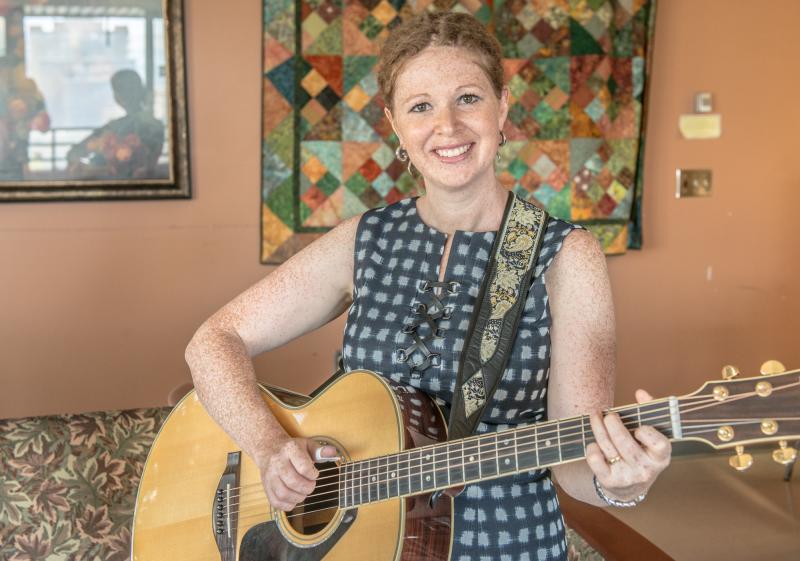Imagine having your life set to music – whether through a mix tape of favourite songs or, better yet, a score specially composed to celebrate your life? For some, that would seem like a dream come true. For Lucy Thomas, a music therapist who works with palliative care patients at St. Paul’s Hospital, it is a fitting and beautiful way to help patients create a legacy that may be heard by generations to come.
Because Thomas has been keenly attuned to the healing powers of music since childhood, it makes sense that she is equally passionate about it playing a therapeutic role, enabling people with advanced disease to live out their lives on a high note. Her mom was a piano teacher who instructed students with learning disabilities. As a teenager, Thomas sat on the board of trustees for her mom’s organization, Melody, which promotes instrumental teaching for people with learning disabilities. She went on to study music at Birmingham University in the UK.
Although her initial profession was fundraising management, it was always at the back of her head to go into music therapy. She eventually completed the four-year degree program at Capilano University which is the first music therapy program in Canada and considered one of the best.
Given her upbringing, Thomas had assumed she would dedicate her music therapy career to children and people with disabilities, but the combination of music with palliative care inspired her. That’s where she decided to specialize, joining St. Paul’s Hospital in 2016. She is based on the palliative care unit and, as a member of the palliative outreach consult team, also visits palliative care patients on other units.
Legacy CDs are just one of the innovative ways music therapy may be used to support patients on St. Paul’s Hospital’s palliative care unit. According to Thomas, the main role of music therapy in palliative care is to improve a patient’s quality of life by reducing physical, psychological, social and spiritual distress, and to provide comfort in a way which often transcends words alone. Music can be used to manage and alleviate pain and nausea, reduce anxiety and improve sleep, regulate breathing and reduce shortness of breath, diminish disorientation, confusion and agitated behaviour, offer a sense of autonomy and control, and minimize isolation, loneliness and boredom.
A fairly standard music therapy intervention, legacy CDs are made by music therapists for patients in long-term and hospice care – both in and out of hospital. When Thomas begins a legacy CD project, she talks to the patient about important music in his or her life, selects certain songs for the CD, and records the patient telling stories along with the songs. Sometimes she composes original songs on guitar and even inserts names of family members into the song to personalize it. The song may be written for a specific family member, conveying a message. Other songs recount life histories.
“In my experience, songwriting with patients and creating legacy CDs are very effective interventions in that it gives them a sense of purpose through a personally meaningful activity. It can provide distraction from the hospital environment, and elicit feelings of pride, accomplishment and self-worth. It also offers patients a unique way to express their feelings. I have seen patients who were previously bored and sometimes depressed come to life while working on a project like this,” said Thomas.
Thomas says that when she plays familiar music to patients at their bedside, they feel transported to another place and time. In hospitals where patients are surrounded by machines and the sound of people rushing around, music restores a humanizing aspect to their stay.





